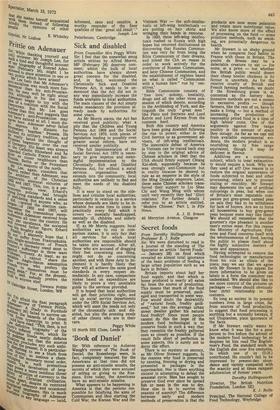Secret foods
From Dorothy Hollingsworth and Professor E. J. Rolfe
Sir: We were disturbed to read in a journal of the standing of The Spectator an article Secret Foods — January 29) on food which revealed an almost total ignorance of the basic problems of feeding 'a large urban population such as we have in Britain.
Britain imports about half her food supply, and that which is home produced is nearly all eaten far from the source of production. This means that much of the food supply must be preserved, packaged and transported in some way. Few would doubt the desirability of "natural foods, freshly gathered," but can the average urban street dweller gather his natural food freshly? Since most people cannot do this the hope of the modern food technologist is to preserve foods in such a way that they resemble the freshly gathered ones as closely as possible. If the result falls short of perfection in some aspects, this is surely not to decry the effort.
There is no mystery or secrecy, as Mr Oliver Stewart suggests, in the reasons why food is preserved by canning, freezing or drying and presented in packages in the supermarket. Nor is there anything sinister in attempting to defeat the seasonal cycle. Man has sought to preserve food ever since he spread fish or meat in the sun to dry. How else is he to survive the seasons of scarcity? The difference between early and modern methods of preservation is that the products are now more palatable and retain more nutritional value. We also know more of the effect of processing on the food — some primitive methods, such as smoking, are potentially dangerous to health.
Mr Stewart is on shaky ground when he compares food habits in France with those in Britain. The poulet de Bresse may be a delectable creature to eat — for some, at a price — but whether the British public would desert their cheap broiler chickens in its favour is uncertain. As for the relative cruelty of British and French farming methods, we doubt if the Strasbourg goose is as contented as the battery hen. Intensive methods are not a means to excessive profits — though farmers, like the rest of us, have to make a living — but a method of increasing the production of reasonably priced food in a time of high labour costs. One of the arguments against free range poultry is the amount of space they occupy. As far as we can tell from available experimental evi dence, the modern product is as nourishing as its free range equivalent, though it may be deficient in flavour.
Additives are a contentious subject, which to treat exhaustive ly would require a book. Why are they used at all? One reason is to restore the original appearance of foods subjected to heat and other processing; others are to prevent staling or rancidity. Mr Stewart may deprecate the use of artificial colourings in peas, but when one of Britain's most reputable com panies put grey-green canned peas on sale they had to be withdrawn for lack of buyers. Are we to force all housewives to buy grey-green peas because some may like them? We should all remember that the gourmet's ripe pheasant is another man's rotten meat. For this reason the Ministry of Agriculture, Fish eries and Food concerns itself with the wholesomeness of food, leaving the public to please itself about the highly subjective matters of taste and appearance.
Having attempted to remove the food technologist or manufacturer from his role as villain of the piece, may we say that we agree with Mr Stewart in his appeal for more information to be given on labels in a form the consumer can understand. We should also like to see more control of the pictures on packages — these should obviously bear strict relationship to the contents.
So long as society in its present numbers lives in large cities, far from sources of food production, to suggest that food processing is anything but a necessity betrays if not Utopianism, plain ignorance of the facts.
If Mr Stewart really wants to know what it was like for a poor person to live before the advent of the modern food technology he so despises let him read The Englishman's Food, the standard work on the English diet over five centuries, to which one of us (D.H.) contributed. He couldn't fail to be impressed by present-day abundance and variety compared with the scarcity and at times rampant adulteration of former years.
Dorothy Hollingsworth Director, The British Nutrition Foundation, London SE1 E. J. Rolfe Principal, The National College of Food Technology, Weybridge










































 Previous page
Previous page